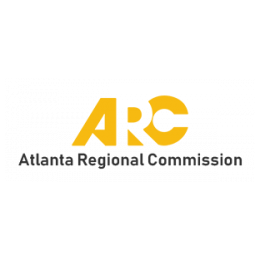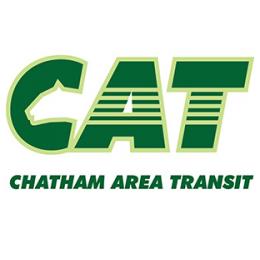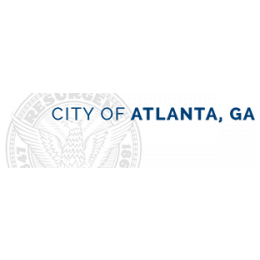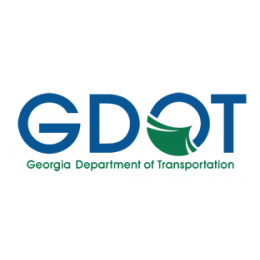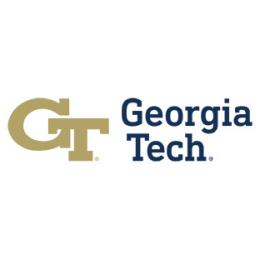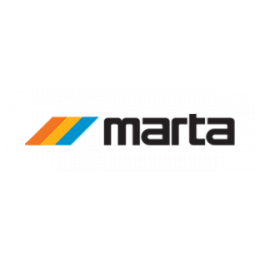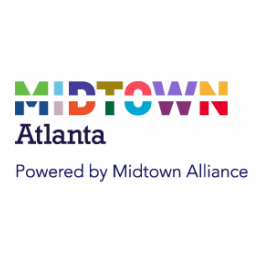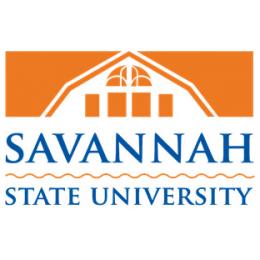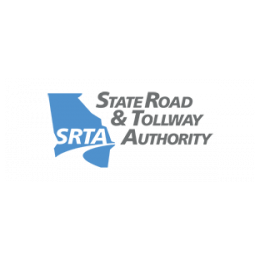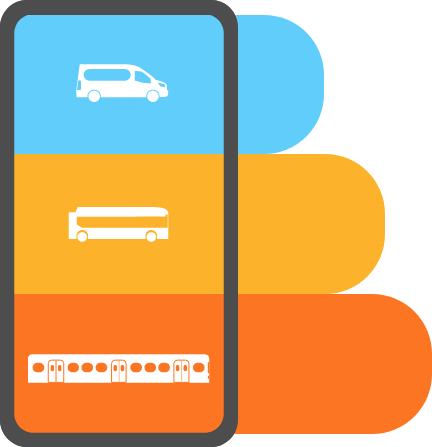
The On-Demand Multimodal Transit System project envisions the next generation of mobility, which would make transit faster, more convenient, and more equitable.
The system uses shuttles to solve the “first/last mile” problem, i.e., the inability to take travelers all the way from their origin to their destination. Shuttles, bus rapid transit (BRT), and existing rail lines work together to connect the city and reduce congestion. Additionally, the system finds the optimal path for a user to take from their origin to their destination, increasing overall speed and convenience. The project simulates implementation in the Atlanta region to validate the On-Demand Multimodal Transit System’s scalability and ability to work in very complex regions.
In the United States, car ownership is still the best predictor of upward social mobility. Public transportation has the potential to promote equity, mitigate congestion and provide environmentally friendly and cost-effective mobility. By solving the first/last mile problem, we can reduce the amount of travelers who prefer private vehicles, reducing congestion and harmful emissions.
Vehicles

Shuttles act as a first and last mile solution

Bus rapid transit connects users to rail stations

The backbone of the system, which runs on a fixed schedule
Benefits
Buses, shuttles, and rails all work together for greater accessibility
Vehicles are synchronized for convenient and fast transfers
Shuttles provide a last-mile transit solution for passengers
Simulation
Impact

Convenience
The system picks up users wherever they are and drops them off directly at their destination, while an app guides them through the trip.

Cost
The system reduces cost by avoiding empty vehicles.

Equity
Shuttles mean that no matter what neighborhood you live in, you’ll have access to reliable and fast transit.
Researchers




News
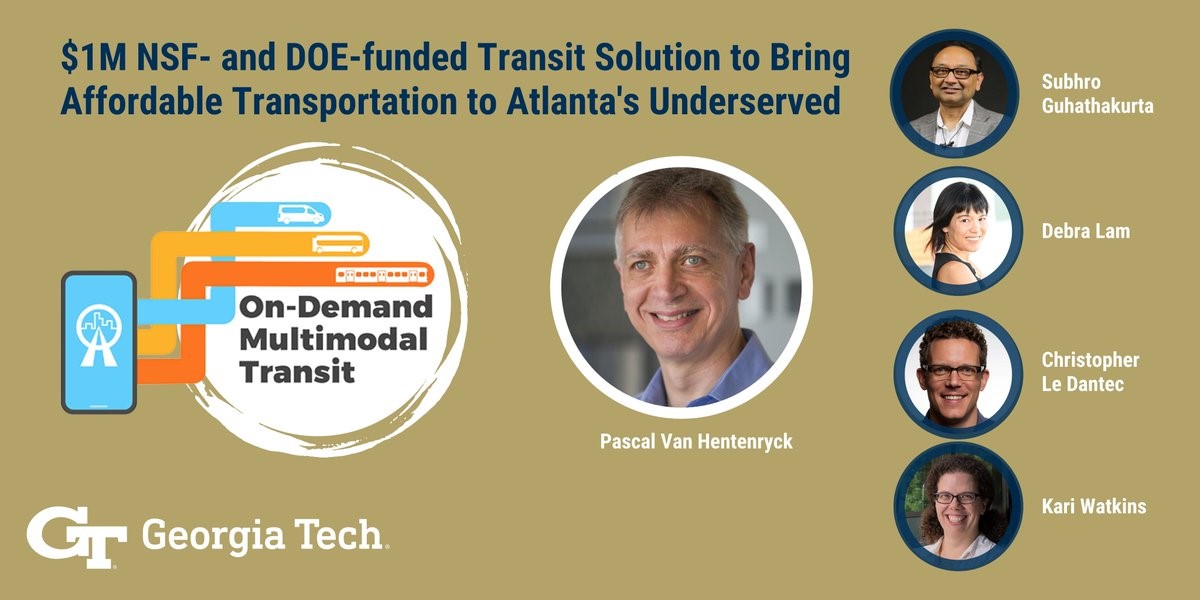
On-Demand Multimodal Transit Solution to Bring Equitable, Affordable Transportation to Atlanta’s Underserved Communities
The National Science Foundation (NSF), in partnership with the Department of Energy, has awarded a $1 million Stage 2 Civic Innovation Challenge grant to a team led by A. Russell Chandler III Chair and Professor Pascal Van Hentenryck to pilot an On-Demand Multimodal Transit System (ODMTS) in Atlanta.
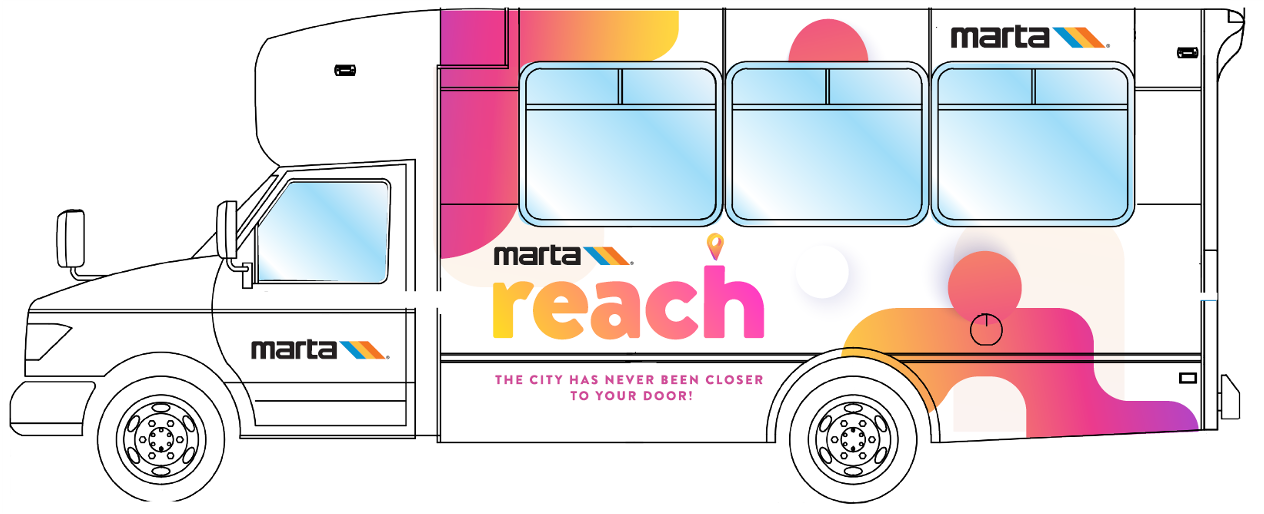
MARTA, Georgia Tech Awarded Grant to Pilot On-Demand Multimodal Transit System
Civic Innovation Challenge Award Provides $1M for Community-Based Mobility Solution
Talks
Piloting On-Demand Multimodal Transit in Atlanta
MARTA November 18, 2021 - Board Committee Meeting
MARTA Reach - Project Outcome
MARTA Reach by 11Alive
Atlanta Pilot - Animation
Mobility Patterns in Atlanta
Large Scale Evacuations
Keynote: South Africa OR Society
IISE Annual 2019 - Keynote
Publications
In Press
Mobility-on-Demand Versus Fixed-Route Transit Systems: An Evaluation of Traveler Preferences in Low-Income Communities. Xiang Yan, Xilei Zhao, Yuan Han, Pascal Van Hentenryck, Tawanna Dillahunt, Transportation Research Part A.
Spatio-Temporal Point Processes with Attention for Traffic Congestion Event Modeling. Shixiang Zhu, Ruyi Ding, Minghe Zhang, Pascal Van Hentenryck, and Yao Xie. IEEE Transactions on Intelligent Transportation Systems.
2021
Mobility-on-Demand Versus Fixed-Route Transit Systems: An Evaluation of Traveler Preferences in Low-Income Communities. Xiang Yan, Xilei Zhao, Yuan Han, Pascal Van Hentenryck, Tawanna Dillahunt, Transportation Research Part A.
Branch and Price for Bus Driver Scheduling with Complex Break Constraints. Lucas Kletzander, Nysret Musliu, and Pascal Van Hentenryck. Proceeding of The Thirty-Fifth AAAI Conference on Artificial Intelligence (AAAI-21), February, 2021.
Spatio-Temporal Point Processes with Attention for Traffic Congestion Event Modeling. Shixiang Zhu, Ruyi Ding, Minghe Zhang, Pascal Van Hentenryck, and Yao Xie. IEEE Transactions on Intelligent Transportation Systems.
Capturing Travel Mode Adoption in Designing On-demand Multimodal Transit Systems. Beste Basciftci and Pascal Van Hentenryck. ArXiv:2101:01056.
Commuting with Autonomous Vehicles: A Branch and Cut Algorithm with Redundant Modeling, Mohd. Hafiz Hasan and Pascal Van Hentenryck. ArXiv:2101.01072.
2020
Prediction and Behavioral Analysis of Travel Mode Choice: A Comparison of Machine Learning and Logit Models. Xiang Yan, Xilei Zhao, Alan Yu, Pascal Van Hentenryck. Travel Behaviour and Society. Volume 20, Pages 22-35, July 2020.
Real-Time Dispatching of Large-Scale Ride-Sharing Systems: Integrating Optimization, Machine Learning, and Model Predictive Control. Connor Riley, Pascal Van Hentenryck, and Enpeng Yuan. In the Proceedings of 29th International Joint Conference on Artificial Intelligence (IJCAI-20), Tokyo, Japan 2020.
Transfer-Expanded Graphs for On-Demand Multimodal Transit Systems. Kevin Dalmeijer and Pascal Van Hentenryck. In the Proceedings of the 17th International Conference on the Integration of Constraint Programming, Artificial Intelligence, and Operations Research (CPAIOR 2020), Vienna, Austria, May, 2020.
Bilevel Optimization for On-Demand Multimodal Transit Systems. Beste Basciftci and Pascal Van Hentenryck. In the Proceedings of the 17th International Conference on the Integration of Constraint Programming, Artificial Intelligence, and Operations Research (CPAIOR 2020), Vienna, Austria, May, 2020.
Optimization Models for Estimating Transit Network Origin-Destination Flows with AVL/APC Data. Xinyu Liu, Pascal Van Hentenryck, and Xilei Zhao. Transportation Board Annual Meeting, January 2020.
Shared E-scooters: Business, Pleasure, or Transit? William Espinoza, Matthew Howard, Julia Lane, Pascal Van Hentenryck, Transportation Board Annual Meeting, Washington DC, January 2020.
Distilling Black-Box Travel Mode Choice Model for Behavioral Interpretation. Xilei Zhao, Zhengze Zhou, Xiang Yan, Pascal Van Hentenryck. In the 2020 Transportation Board Annual Meeting, January 2020.
Joint Vehicle and Crew Routing and Scheduling. Edward Lam, Pascal Van Hentenryck, and Phil Kilby, Transportation Science, 54(2), Pages 299-564. March-April, 2020.
2019
On-Demand Mobility Systems, Pascal Van Hentenryck, ISE Magazine, Fall 2019.
The Flexible and Real-Time Commute Trip Sharing Problems. Hafiz Hasan and Pascal Van Hentenryck. In the 24th International Conference on the Principles and Practice of Constraint Programming, Stamford, CT, September 2019.
A Column Generation for Online Ride-Sharing Services. Connor Riley, Antoine Legrain, and Pascal Van Hentenryck. In the Proceedings of 16th International Conference on the Integration of Constraint Programming, Artificial Intelligence, and Operations Research (CPAIOR 2019), Thessaloniki, Greece, June 4–7, 2019.
Benders Decomposition for the Design of a Hub and Shuttle Public Transit System. Arthur Maheo, Philip Kilby, and Pascal Van Hentenryck. Transportation Science. 53(1), 77-88, January-February 2019.
2018
Constraint and Mathematical Programming Models for Integrated Port Container Terminal Operations, Damla Kizilay, Deniz T. Eliiyi, and Pascal Van Hentenryck. 15th International Conference on the Integration of Constraint Programming, Artificial Intelligence, and Operations Research, Delft, The Netherlands, June 26-29, 2018.
2016
A Branch-and-Price-and-Check Model for the Vehicle Routing Problem with Location Resource constraints. Edward Lam and Pascal Van Hentenryck. Constraints 21(3): 394-412 (2016) (Fast-Track Paper from CPAIOR’06).
Optimizing Infrastructure Enhancements for Evacuation Planning. Kunal Kumar, Julia Romanski, and Pascal Van Hentenryck. Proceedings of the Thirtieth AAAI Conference on Artificial Intelligence (AAAI-16), Phoenix, Arizona, February, 2016.
A Conflict-Based Path-Generation Heuristic for Evacuation Planning. Victor Pillac, Pascal Van Hentenryck, and Caroline Even. Transportation Research Part B., 83, 136-150, January, 2016.
2015
A Constraint Programming Approach for Non-Preemptive Evacuation Scheduling Caroline Even, Andreas Schutt, and Pascal Van Hentenryck. Proceedings of the International Conference on Principles and Practice of Constraint Programming, Cork, Ireland.
A Column-Generation Approach for Joint Mobilization and Evacuation Planning Victor Pillac, Manuel Cebrian, and Pascal Van Hentenryck. Constraints, 20(3), 285-303, July 2015. (fast-track paper from CPAIOR’15).
A Multi-Stage Very Large-Scale Neighborhood Search for the Vehicle Routing Problem with Soft Time-Windows Sebastien Mouthuy, Florence Massen, Yves Deville, Pascal Van Hentenryck. Transportation science, 49(2), 223-238, May 2015
2014
Multi-period vehicle loading with stochastic release dates Tasemin Arda, Yves Crama, David Kronus, Thierry Pironet, Pascal Van Hentenryck. EURO Journal on Transportation and Logistics, pp. 93119, 10.1007/s13676-013-0035-z.
2012
Randomized Adaptive Vehicle Decomposition for Large-Scale Power Restoration Ben Simon, Carleton Coffrin, Pascal Van Hentenryck. Proceedings of the International Conference on Integration of Artificial Intelligence and Operations Research Techniques in Constraint Programming for Combinatorial Optimization Problems (CPAIOR), Nantes, France, pp. 379-394, May, 2012.
